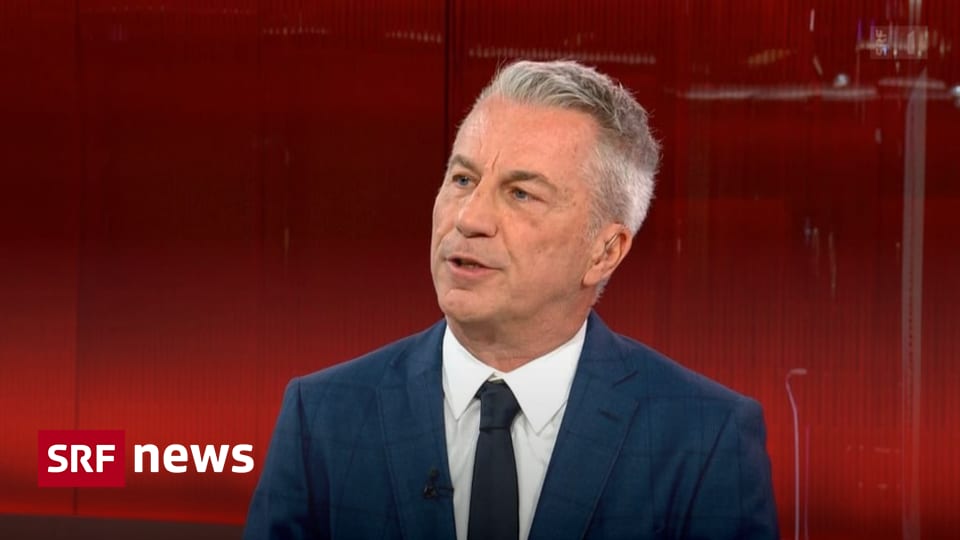Credit Suisse has suffered a massive loss of confidence. In order to get the badly hit big bank back on track, there was a lot of hustle and bustle at the weekend. The regulators are pushing the competitor bank UBS to take over CS in whole or in part. SRF business editor Reto Lipp assesses the current development and the rumors circulating in the “Tagesschau”.
SRF News: There are almost no studio talks in the “Tagesschau”. Unless there’s a fire. SRF business editor Reto Lipp: Is it burning?
Reto Lipp: Yes, it’s ablaze. If these speculations are correct, then there really are signs of an earthquake in the Swiss financial center in the Swiss economy. Because Credit Suisse is also a corporate bank. Of the 100 largest companies in Switzerland, 80 have business relationships with CS. It’s about millions of customers and bank accounts.
There are only rumours, but the question arises: is it a good solution for CS to be taken over by UBS?
No, it’s not a good solution. We can already see that CS is “too big to fail”, too big to go under, which is why everyone is now dealing with CS, Finma, the National Bank, the Federal Council. If one such bank is merged with another, then the resulting bank is a much larger bank. Recently it has always been CS that has done well and UBS has had a problem – or vice versa. But in the end we will have one monster bank, and if it goes bad, the whole of Switzerland will go bad.
The current pace of development is also remarkable. Why does it have to be so fast now?
There would be other solutions. For example, healthy parts of CS could have been transferred to other banks, such as fund business to UBS or private banking to a private bank. But that would have taken weeks and would have been very complicated. I think it is primarily the National Bank that is pushing for a simple, quick solution. Because the National Bank is afraid of next Monday, when the bank counters and the stock exchanges open again, that there could be a total crash. That’s why she pushes the pace. And the only realistic way to pull that off in a weekend is through an acquisition.
It’s usually like this: in the case of a merger, both want it, in the case of a takeover, one definitely wants it. But you get the impression that UBS doesn’t want to?
UBS is very stubborn and of course there is a reason for that: UBS has recovered in recent years – after it had to be rescued once. The bank is very healthy today, makes profits and has a high stock market value. Merging a healthy bank with a sick bank is of course problematic, because the sick can infect the healthy. What we don’t want now is for UBS to have a problem too. The whole thing is highly problematic.
CS has 16,000 employees in Switzerland. In many places there are CS branches opposite UBS branches, so there is a lot of redundancy. Is there a huge wave of layoffs?
That could be. Both banks have well over 300 branches, which will be far too many. There are duplications in IT, human resources and management anyway. This is really a difficult situation, and the employees will be faced with a lot. But there are two bright spots: It would be quite possible for a foreign bank to take over certain small parts and then continue in Switzerland. There were rumors that Deutsche Bank was interested and could keep these employees. Luckily, the Swiss labor market is in very good shape and there is a shortage of skilled workers – so specialists are currently in demand.
The end of a once proud bank may be announced in the next few hours or tomorrow evening. There is no avoiding the last question: Who is to blame?
The question of guilt will certainly arise. I would put the emphasis on the board of directors. People always say the managers were terrible: Brady Dougan, Tidjane Thiam and also Thomas Gottstein. But you have to say that it’s the boards of directors that have put the wrong people in power for ten years. It’s the boards of directors who have watched the bank cling to investment banking for far too long. It is the boards of directors that have not properly overseen risk management. No one talks about the board of directors, except for Urs Rohner, who actually was in power for ten years as chairman of the board. But not everyone can hide behind Rohner – everyone was there.
Florian Inhauser conducted the interview.
